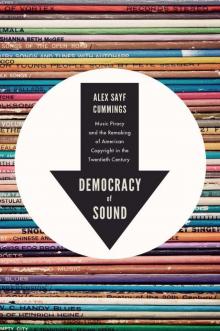Democracy of Sound: Music Piracy and the Remaking of American Copyright in the Twentieth Century 

Genre: Other6
Published: 2013
View: 2401
Read OnlineRead Democracy of Sound: Music Piracy and the Remaking of American Copyright in the Twentieth Century Storyline:
It was a time when music fans copied and traded recordings without permission. An outraged music industry pushed Congress to pass anti-piracy legislation. Yes, that time is now; it was also the era of Napster in the 1990s, of cassette tapes in the 1970s, of reel-to-reel tapes in the 1950s, even the phonograph epoch of the 1930s. Piracy, it turns out, is as old as recorded music itself. In Democracy of Sound, Alex Sayf Cummings uncovers the little-known history of music piracy and its sweeping effects on the definition of copyright in the United States. When copyright emerged, only visual material such as books and maps were thought to deserve protection; even musical compositions were not included until 1831. Once a performance could be captured on a wax cylinder or vinyl disc, profound questions arose over the meaning of intellectual property. Is only a written composition defined as a piece of art? If a singer performs a different interpretation of a song, is it a new and distinct work? Such questions have only grown more pressing with the rise of sampling and other forms of musical pastiche. Indeed, music has become the prime battleground between piracy and copyright. It is compact, making it easy to copy. And it is highly social, shared or traded through social networks--often networks that arise around music itself. But such networks also pose a counter-argument: as channels for copying and sharing sounds, they were instrumental in nourishing hip-hop and other new forms of music central to American culture today. Piracy is not always a bad thing. An insightful and often entertaining look at the history of music piracy, Democracy of Sound offers invaluable background to one of the hot-button issues involving creativity and the law.Review"From Supreme Court battles over player piano rolls to the music industry's $75 trillion lawsuit against Limewire, Democracy of Sound shows how we arrived at today's debates about music ownership and piracy. Cummings is not only a skilled historian, but also a lively story-teller who can explain complex copyright issues with admirable clarity. For anyone with an opinion about the politics, economics, and ethics of music copying, this book offers essential perspective." --David Suisman, author of Selling Sounds: The Commercial Revolution in American Music"Piracy may be the dominant issue troubling musicians and the culture industries today, but as Alex Cummings shows, struggles over appropriation, sharing, and theft have long shaped the entire history of recorded sound and the music business. Combining legal, cultural, and business history, Democracy of Sound elegantly and impartially illuminates how Americans made music into a thing, while fighting bitterly over who would gain access to that music. Anyone with any interest in the future of copyright or in our cultural past should read this important book." --Charles F. McGovern, author of Sold American: Consumption and Citizenship, 1890-1945"Beautifully crafted, intelligently researched, and cogently argued, Democracy of Sound offers readers a compelling analysis of the changing legal status of recorded music in the United States from the 1870s to the present. Many books have been written about intellectual property; few have done more to make its significance accessible to the general reader. It will appeal not only to specialists in American studies, music, and law, but also to anyone who cares about American popular culture, past and present." --Richard John, author of Network NationAbout the AuthorAlex Sayf Cummings is Assistant Professor of History at Georgia State University.Pages of Democracy of Sound: Music Piracy and the Remaking of American Copyright in the Twentieth Century :